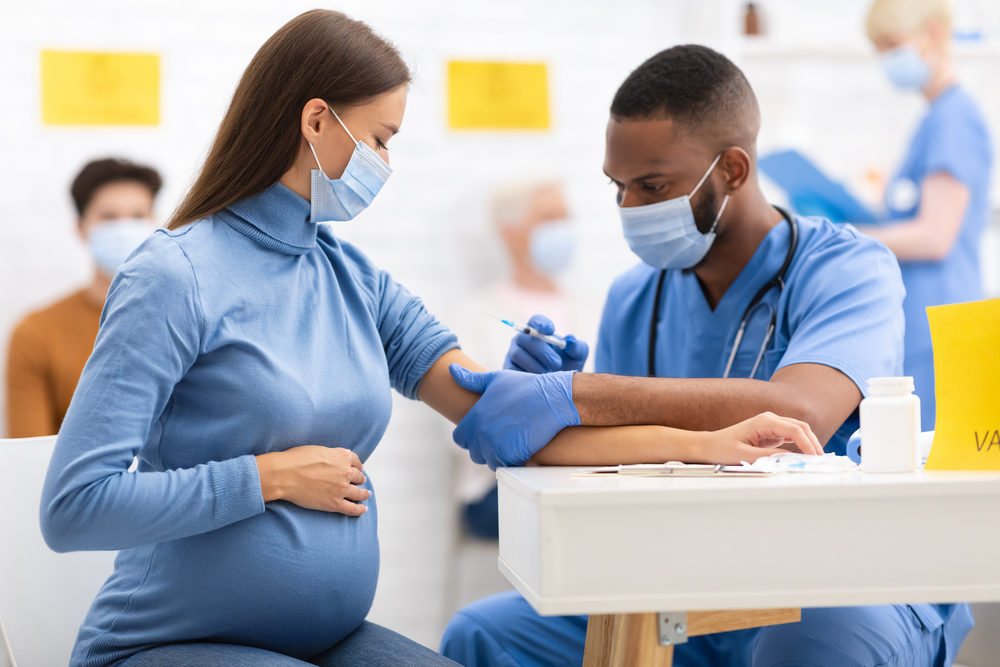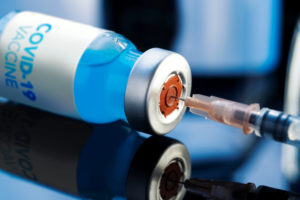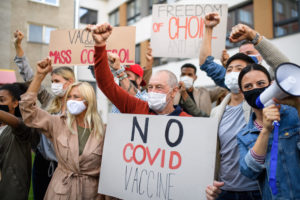
Encouraging news for those who are pregnant and choose to receive a Pfizer or Moderna mRNA COVID-19 vaccine. Preliminary results from a study published in The New England Journal of Medicine highlight that the Pfizer and Moderna vaccines do not show obvious safety signals among pregnant women. More studies are currently underway in many countries around the world, but the initial findings are promising and may help pregnant women decide whether or not to get vaccinated.
The study is based on observations and reports of more than 35,000 American women who received the Pfizer or Moderna vaccine while pregnant. Johnson & Johnson’s Janssen vaccine was not included in this study as it was unavailable at the time.
COVID-19 Increases Pregnancy Complications
While COVID-19 can cause serious illness for anyone infected by the virus, those pregnant or recently pregnant are at an increased risk. They are at higher risk for hospitalization, a stay in intensive care, and the use of a ventilator or special equipment to assist with breathing. COVID-19 has claimed the lives of thousands, including women expecting.
Pregnant women infected with COVID-19 have a 76% greater risk of preeclampsia or eclampsia (a severe complication of preeclampsia). This pregnancy-induced high blood pressure condition can be life-threatening to the mother and the baby. Infected with COVID-19, pregnant women are three times more likely to have a severe infection when compared to the general public. Unfortunately, pregnant women are five times more likely to be admitted to the ICU.
COVID-19 infections can cause miscarriages – 13% of pregnant women listed on the U.S. vaccine safety registry experienced a miscarriage. Nine percent of pregnant women listed on the registry experienced a premature birth – birth before 37 weeks gestation. There were almost 4,000 women enrolled in the registry.
There is some encouraging news for pregnant moms who plan on breastfeeding. Multiple studies have highlighted that breastfeeding does not appear to transmit the virus between mothers and babies.
Countries worldwide, including the U.S., have added pregnant women to priority groups to receive vaccines. Vaccines can have complications, but the FDA and CDC research clearly state that vaccines should be given to those expecting babies. Research has shown that the current COVID-19 vaccines will not affect your fertility, nor have birth defects or birth injuries been observed.
Reducing the Risk of Pregnancy Complications
One way to reduce the risk of COVID-related pregnancy complications is to reduce your risk of contracting COVID-19. While there is no way to reduce your risk completely, small steps can help you lower your risk.
- Consider getting a COVID-19 vaccine. Speak to your healthcare team about any questions you might have about the vaccine.
- Consult your OB/GYN as a member of your healthcare team.
- Limit in-person contact with people who may be infected with COVID-19 or may have been exposed to COVID-19.
- Wear a mask – avoid those who are not wearing a mask. Ask that others around you wear a mask that fully covers the mouth and nose.
- Socially distance yourself from others. The CDC recommends a distance of at least 6 feet away from others or two arm lengths.
- Avoid crowded and poorly ventilated areas.
- Wash your hands – using soap and water. If water and soap are not available, use a hand sanitizer with 60%+ alcohol.
To Vaccinate or Not To Vaccinate
Choosing or deciding not to receive a COVID-19 vaccine is a deeply personal decision. Weigh the risks of contracting COVID while pregnant with the benefits of receiving a COVID vaccine. Speak to your healthcare team about questions and concerns you might have. Discuss the COVID-vaccine with your OB/GYN. Consider how active COVID is in your community. Studies on fetal development indicate no concerns about the development of babies should you choose to receive a COVID-19 vaccine.
Complications of COVID-19 Vaccines
Some minor vaccine complications can include pain, redness or swelling at the injection site. You also could feel muscle pain, headache, tiredness or fever and chills. These are all common side effects.
Contact your healthcare team if the injection site is more tender after 24 hours or if the redness worsens after 24 hours of receiving the vaccine. Complications from a vaccine can affect your everyday activities, but they will dissipate. If you have ever experienced a severe allergic reaction to a vaccine, work with your healthcare provider to determine if you should be vaccinated and which vaccine would be best for you.
COVID-19 Vaccine-Related Injuries
COVID vaccine manufacturers, Moderna and Pfizer, are not responsible for any injury or illness that their vaccine may cause. They are protected under the Public Readiness and Emergency Preparedness (PREP) Act until 2024. And, since the COVID-19 vaccines received emergency approval, compensation is currently only available through the Countermeasures Injury Compensation Program (CICP). If you choose to receive a COVID-19 vaccine and experience an injury, filing a claim and receiving compensation may be difficult without the help of an experienced vaccine injury attorney. Before the COVID-19 pandemic, CICP had a history of rejecting claims. Consulting a knowledgeable attorney could make a difference in a successful claim. Unfortunately, CICP will not cover any legal fees.
Related: Who Is Responsible For COVID-19 Vaccine Injuries?
Should you or a loved one experience a vaccine-related injury, contact the dedicated and skilled team at Paulson & Nace, PLLC. Schedule a free case evaluation by calling 202-463-1999 or contact us online.
@thumbnail.jpg)
Both an Emory School of Law graduate and MBA graduate of Goizueta Business School at Emory, Chris Nace focuses his practice on areas of medical malpractice, drug and product liability, motor vehicle accidents, wrongful death, employment discrimination and other negligence and personal injury matters.














Comments for this article are closed.